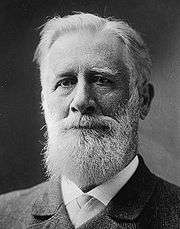Otto von Gierke

Otto Friedrich von Gierke (11 January 1841 – October 10, 1921) was a German legal scholar and historian. In his four volume magnum opus entitled Das deutsche Genossenschaftsrecht (German Law of Associations),[1] he pioneered the study of social groups, and the importance of associations in German life, which stood between the divide of private and public law. During his career at the Berlin University's law department, Gierke was a leading critic of the newly drafted German Civil Code, arguing that it had been moulded in an individualistic frame that was inconsistent with German social traditions. He helped to advance the concept of social law, over the classical division of public law and private law.[2]
Biography
Otto von Gierke was born in Stettin (Szczecin), Pomerania, and died in Berlin. He specialised in the study of the German antecedents of German law. His view of the Rechtsstaat (state on a legal basis), and his emphasis on the federal nature of medieval states, became important and debated. In fact, he said the society grows up because people form groups and groups of groups, from families to the State. He stood as an opponent of the trend of civil law interpretation and theorising. His theory took up some older ideas from Thomas Aquinas and Dante Alighieri (De Monarchia).
Abroad he was a major influence on the British historian of law F. W. Maitland, who translated as Political Theories of the Middle Ages some of Gierke's major works, and on John Neville Figgis.[3]
Publications
- Das deutsche Genossenschaftsrecht (Berlin 1868-1913) 4 volumes
- vol 1. Rechtsgeschichte der deutschen Genossenschaft (1868) introduction translated by John D Lewis, The Genossenschaft - Theory of Otto von Gierke; A Study in Political Thought (1936) and selections translated by Mary Fischer and Anthony Black as Community in Historical Perspective (1990)
John D. Lewis, The Genossenschaft-Theory of Otto von Gierke: A Study in Political Thought (1935)
- vol 2. Geschichte des deutschen Körperschaftsbegriffs (1873)
- vol 3. Die Staats- und Korporationslehre des Alterthums und des Mittelalters und ihre Aufnahme in Deutschland (1881). §11, pages 500-640, 'Die publicistischen Lehren des Mittelalters' was translated by FW Maitland as Political Theories of the Middle Ages (1900).
- vol 4. Die Staats- und Korporationslehre der Neuzeit (1913) Section V, §§14-8 translated by Ernest Barker (1934)
- Die soziale Aufgabe des Privatrechts (Berlin 1889) translated by Ewan McGaughey as 'The Social Role of Private Law' (2016)
- Johannes Althusius und die Entwicklung der naturrechtlichen Staatstheorie (Berlin 1880) translated by Bernard Freyd as The Development of Political Theory (1939)
- Naturrecht und Deutsches Recht: Rede zum Antritt des Rektorats der Universität Breslau am 15. Oktober 1882 gehalten (Frankfurt 1883) translated by Ernest Barker as Natural law and the theory of society, 1500 to 1800 (1934)
- Rudolf von Gneist: Gedächtnissrede gehalten in der Juristischen Gesellschaft zu Berlin am 19. October 1895.
- Deutsches Privatrecht (Leipzig 1895) 3 volumes
- Schuld und Haftung im älteren deutschen Recht, insbesondere die Form der Schuld- und Haftungsgeschäfte (1910)
See also
Notes
- ↑ The word Genossenschaft can also be literally translated "companionship". But it is different from "companies" which in English tend to connote economic associations.
- ↑ Die soziale Aufgabe des Privatrechts (Berlin 1889) translated by E McGaughey as 'The Social Role of Private Law' (2016)
- ↑ Political Theories of the Middle Ages by Dr. Otto Gierke, Professor of Law in the University of Berlin; Translated with an Introduction by Frederick William Maitland, LL.D., D.C.L., Downing Professor of the Laws of England in the University of Cambridge. Cambridge: At the University Press. 1900. Retrieved 25 August 2018 – via Internet Archive.
References
- Scruton, Roger,"Gierke and the corporate person" in The Philosopher on Dover Beach, Manchester, Carcanet Press, 1990. ISBN 0-85635-857-6
External links
| Wikimedia Commons has media related to Otto von Gierke. |
- Works by or about Otto von Gierke at Internet Archive
- 'The Social Role of Private Law' (1889) translated by E McGaughey (2016)
- Political Theories of the Middle Ages